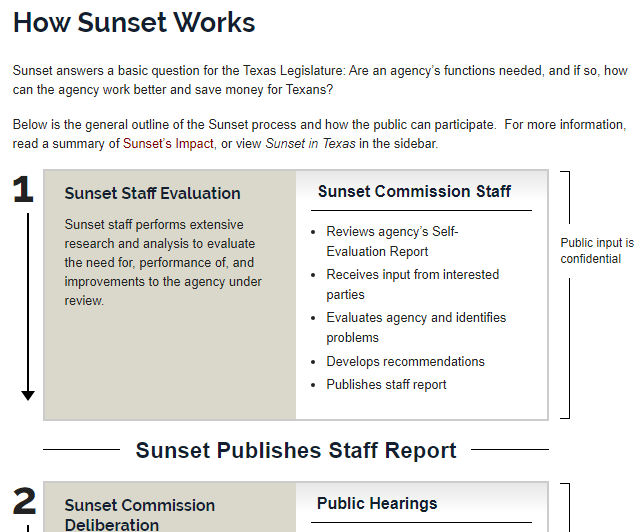- "Mass Shootings and the Texas Response," Texas Public Radio, September 16, 2019
- Texas Safety Action Report, Governor Greg Abbott, September 12, 2019
- Executive Order GA-07, Relating to the Prevention of Mass Attacks, Governor Greg Abbott, September 5, 2019
- "Odessa Residents Try to Understand How a Shooting Could Happen in a 'Utopia in the Desert'," KERA News, September 5, 2019
- "After Mass Shooting, Odessa’s Mayor is 'Mad as Hell' But Helping His City Cope," Texas Tribune, September 2, 2019
- "'Warrior' Prevents More People from Becoming Victims," Midland Reporter-Telegram, September 1, 2019
| HJR 72 | Prop. 1 | The constitutional amendment permitting a person to hold more than one office as a municipal judge at the same time. | |
| SJR 79 | Prop. 2 | The constitutional amendment providing for the issuance of additional general obligation bonds by the Texas Water Development Board in an amount not to exceed $200 million to provide financial assistance for the development of certain projects in economically distressed areas. | |
| HJR 34 | Prop. 3 | The constitutional amendment authorizing the legislature to provide for a temporary exemption from ad valorem taxation of a portion of the appraised value of certain property damaged by a disaster. | |
| HJR 38 | Prop. 4 | The constitutional amendment prohibiting the imposition of an individual income tax, including a tax on an individual’s share of partnership and unincorporated association income. | |
| SJR 24 | Prop. 5 | The constitutional amendment dedicating the revenue received from the existing state sales and use taxes that are imposed on sporting goods to the Texas Parks and Wildlife Department and the Texas Historical Commission to protect Texas’ natural areas, water quality, and history by acquiring, managing,and improving state and local parks and historic sites while not increasing the rate of the state sales and use taxes. | |
| HJR 12 | Prop. 6 | The constitutional amendment authorizing the legislature to increase by $3 billion the maximum bond amount authorized for the Cancer Prevention and Research Institute of Texas. | |
| HJR 151 | Prop. 7 | The constitutional amendment allowing increase distributions to the available school fund. | |
| HJR 4 | Prop. 8 | The constitutional amendment providing for the creation of the flood infrastructure fund to assist in the financing of drainage, flood mitigation, and flood control projects. | |
| HJR 95 | Prop. 9 | The constitutional amendment authorizing the legislature to exempt from ad valorem taxation precious metal held in a precious metal depository located in this state. | |
| SJR 32 | Prop. 10 | The constitutional amendment to allow the transfer of a law enforcement animal to a qualified caretaker in certain circumstances. |
- Track traffic safety laws state by state. (National Conference of State Legislatures, September 18, 2019)
- Compare prescription drug prices in the U.S. to prescription drug prices in other countries. (U.S. House Ways & Means Committee, September 2019)
- Read about federal funding designated for reimbursing Texas health care providers for charity care. (Texas Health and Human Services Commission, October 1, 2019)
- Explore free access to case law. (Harvard Law School, ©2019)
- "New federal loan-forgiveness program still rejects 99% of applicants." By Michael Vasquez. Chronicle of Higher Education, September 20, 2019, p. A21.
Highlights problems with the United States Department of Education's college loan forgiveness program for individuals going into public service. - "Fannie Mae and Freddie Mac: Home truths." Economist, September 14th-20th, 2019, pp. 67-68.
Discusses United States Treasury Secretary Steven Mnuchin's plan to reform the federal housing finance system. - "Fiscal highlights from the 86th Legislature: Legislative session tackled public education, property taxes." By Ramona Reeves. Fiscal Notes, September 2019, pp. 1, 3-5.
Provides an overview of the 2020-2021 state budget and details legislation passed by the 86th Legislature on school finance (HB3), local property taxes (SB2), teacher retirement (SB500 and SB12), online sales taxes (HB1525 and HB2153), and investment of the Rainy Day Fund into the Legacy Fund (SB69). - "The 'green rush,' CBD businesses flourishing under new law." By Neetish Basnet. Fort Worth Business Press, September 16-22, 2019, pp. 26-27.
Discusses the new industrial hemp law and its impact on businesses in Texas. Quotes Texas Agriculture Commissioner Sid Miller. - "Serving rural America: Health insurance providers at work." Internet Resource, September 2019, pp. 1-6.
Presents five case studies featuring health insurance providers' various approaches to delivering quality health care in rural America, while addressing the problem of rural hospital closings and mergers. - "Toolkit: State strategies to support older adults aging in place in rural areas." By Neva Kaye and Kristina Long. Internet Resource, September 2019, pp. 1-23.
Provides examples of strategies states are using to support aging in place for older adults in rural areas. Highlights SB670, 86th Legislature, and SB1107, 85th Legislature, R.S., as examples of legislation removing the barriers to the use of telehealth and telemedicine. - "Federalism as an antidote to polarization over health care policy." By Stuart M. Butler. JAMA (Journal of the American Medical Association), September 24, 2019, pp. 1131-1132.
Recounts how federalism historically has helped to resolve policy impasses by allowing states to opt in — or out — with regard to disputed programs such as welfare, Medicaid, and the Affordable Care Act. - "Understanding Wayfair: A user-friendly guide to the biggest state tax case in 30 years." By Rick Najjar and Ted Kontopoulos. Journal of MultiState Taxation and Incentives, October 2019, pp. 6-17.
Discusses the fundamental concepts and state tax ramifications of South Dakota v. Wayfair, in which the United States Supreme Court held that physical presence is no longer required for sales tax collection on remote or online sellers. Addresses textualism versus intentionalism in enactment of state tax statutes, substantial nexus, and the greater importance of due process. - "The new trustbusters are coming for big tech." By Thomas Hazlett. Reason, October 2019, pp. 20-27.
Considers the economic school of thought known as "new structuralism," or "hipster antitrust," which advocates for regulation and antitrust action. Argues "nondiscrimination" regulations aimed at providing equal access favor legacy technologies at the expense of startups and innovation and do not protect consumers as intended. - "The potential pitfalls of combating surprise billing; Comment." By Ike Brannon, David A. Hyman, Benedic Ippolito, and David Kemp. Regulation (CATO Institute), Fall 2019, pp. 40-47.
Discusses three plans Congress is considering to address surprise medical billing: benchmarking payments, mandated in-network guarantee, and independent dispute resolution [IDR]. Suggests IDR is the best mechanism to limit surprise bills, while commentators believe a contract-based approach would outperform IDR. - "Texas K-12 education spending set to rise, but who will pay?" By Jason Saving. Southwest Economy (Federal Reserve Bank of Dallas), Third Quarter 2019, pp. 17-21.
Comments on the education reform package passed by the 86th Legislature (HB3, SB2). Examines why the latest school finance fix may not fully provide a long-term solution to meeting local school districts' needs. - "School finance: Moving mountains." By Daniel Thatcher. State Legislatures, September/October 2019, pp. 17-19.
Draws lessons from the experiences of states that successfully updated or replaced their school funding formulas. - "Bridge to nowhere." By Gus Bova. Texas Observer, September-October 2019, pp. 26-31.
Investigates three companies' plans to build liquefied natural gas [LNG] facilities in South Texas and the local communities' opposition to them. Argues the proposed construction site for the Rio Grande Valley LNG plants will result in the destruction of fragile ecosystems and will pose health and safety risks for nearby residents. Mentions Senator Eddie Lucio and Representative Alex Dominguez. - "Inside the dangerous rise of JUUL." By Jamie Ducharme. Time, September 30, 2019, pp. 40-47.
Profiles e-cigarette maker Juul, a mostly unregulated company that has been linked to the sharp rise in teenage and young adult vaping and nicotine addiction.
- House Committee on Redistricting (Fort Worth)
- House Select Committee on Mass Violence Prevention & Community Safety (Farmers Branch)
- House Committee on Redistricting (Dallas)
- Texas Redistricting, Texas Legislative Council
- Texas Safety Action Report, Governor Greg Abbott, September 12, 2019
- Executive Order GA-07, Relating to the Prevention of Mass Attacks, Governor Greg Abbott, September 5, 2019
- "US Mass Shooters Exploited Gaps, Errors in Background Checks," Associated Press, September 7, 2019
- "The Impact of State Firearm Laws on Homicide and Suicide Deaths in the USA, 1991–2016: A Panel Study," Journal of General Internal Medicine, March 28, 2019
- The Effects of Background Checks, Gun Policy in America, RAND Corporation, March 2, 2018
- Background Checks For Firearm Transfers, 2015 – Statistical Tables, Bureau of Justice Statistics, U.S. Department of Justice, November 30, 2017
- "Firearm Acquisition Without Background Checks: Results of a National Survey," Annals of Internal Medicine, Volume 166, Number 4, February 21, 2017
- Report of Investigation into the United States Air Force's Failure to Submit Devin Kelley's Criminal History Information to the Federal Bureau of Investigation, U.S. Department of Defense, Inspector General, December 6, 2018
- Letter to state criminal justice agencies and associations regarding state and local reporting to the National Instant Criminal Background Check System, Governor Greg Abbott, April 11, 2018, including Survey of State Criminal History Information Systems, 2016, Bureau of Justice Statistics, U.S. Department of Justice, January 2018
- "Anti-Social Media and Violence," Issues in Mental Health Nursing, Volume 40, Issue 6, June 10, 2019
- "Mass Shootings and Media Contagion Theory: Social Media's Influence on Frequency of Incidents," Elon Journal of Undergraduate Research in Communications, Volume 9, Number 2, Fall 2018
- "Mass Shootings and the Media Contagion Effect," presented at the American Psychological Association, August 4, 2016
- Developing a Policy on the Use of Social Media in Intelligence and Investigative Activities: Guidance and Recommendations, Global Justice Information Sharing Initiative, U.S. Department of Justice, February 2013
- The Workforce Crisis, and What Police Agencies are Doing About It, Police Executive Research Forum, September 2019
- "Texas Cybersecurity: Protecting Data Systems" (Labor shortage), Fiscal Notes, Texas Comptroller of Public Accounts, March 2019
- Principles for Growing and Sustaining the Nation's Cybersecurity Workforce, The Aspen Institute, November 2018
- State-Level Projections of Supply and Demand for Behavioral Health Occupations: 2016-2030 (Additional workforce projections and reports), U.S. Department of Health and Human Services, September 2018
- National Initiative for Cybersecurity Education (NICE) Cybersecurity Workforce Framework, U.S. Department of Commerce, August 2017
- Cybersecurity: Statewide Overview (Industry employment), Texas Comptroller of Public Accounts
- Strategic Implementation Plan for Empowering Local Partners to Prevent Violent Extremism in the United States, Office of the President of the United States, October 2016
- Cybersecurity: Utilizing Fusion Centers to Protect State, Local, Tribal, and Territorial Entities Against Cyber Threats (Thesis), Naval Postgraduate School (Monterey, CA), September 2016
- 2014-2017 National Strategy for the National Network of Fusion Centers, National Fusion Center Association, July 2014
- Relationships Between Fusion Centers and Emergency Operations Centers, U.S. Department of Homeland Security, Office of the Inspector General, December 2011
- Fusion Centers and Intelligence Sharing (Justice Information Sharing), U.S. Department of Justice
- Texas Redistricting, Texas Legislative Council
- Explore statistics and data about the U.S. Hispanic population. (Pew Research Center, September 16, 2019)
- See which states incorporate citizen input into the redistricting process. (National Conference of State Legislatures, September 2019)
- Consider the FDA's role in regulating e-cigarettes. (Health Affairs Blog, September 17, 2019)
- Check to see whether a motor carrier business is properly licensed in Texas. (Texas Department of Motor Vehicles, ©2019)
- "When Medicaid takes everything you own." By Rachel Corbett. Atlantic Monthly, October 2019, pp. 72-79.
Examines the Medicaid Estate Recovery Program, which allows states to seek repayment for Medicaid debt by seizing assets, including houses from the estates of Medicaid recipients. Argues this program strips property from people who can least afford the loss, thereby pushing displaced families back into the welfare system. - "Why insurtech startups are flourishing." By Will Anderson. Austin Business Journal, September 13, 2019, p. 22.
Profiles insurtech companies relocating to Austin, companies that construct technology platforms aiming to lower health insurance costs while decreasing risks for self-employed freelance workers and small businesses. - "Drug shortages." Economist, September 14th-20th, 2019, pp. 57-58.
Examines the causes and consequences of an increasing worldwide shortage of medicines and medical supplies. - "Are schools required to be trauma-sensitive?" By Sarah D. Sparks. Education Week, September 4, 2019, pp. 1, 18-19.
Discusses three active lawsuits that challenge how public schools are addressing student disabilities resulting from trauma. - "Quality counts 2019: Educational opportunities and performance in Texas." Education Week, September 4, 2019, pp. 1-7.
Assesses the educational opportunities and performance of Texas and compares them with the national average. Grades and ranks Texas in three categories: chance for success, school finance, and K-12 achievement. - "Post-Harvey auto sales back on track: Texans are on the road again." By Jackie Benton. Fiscal Notes, September 2019, pp. 1-2.
Discusses the effect of Hurricane Harvey on automobile sales. Charts Texas motor vehicle sales tax collections from fiscal years 2015-2018. - "The dynamics of Medicaid enrollment, employment, and beneficiary health status." By Jessica P. Vistnes and Steven C. Hill. Health Affairs, September 2019, pp. 1491-1495.
Notes that 13.9 percent of new, nonelderly adult Medicaid beneficiaries in 2015-2016 had experienced a decline in health before enrollment, and 14.1 percent had jobs that ended before they enrolled. Advises careful design of Medicaid work requirement policies that consider exemptions, reasonable accommodations, and gaps in employment. - "How states can improve America’s immigration system." By John Hudak and Christine Stenglein. Internet Resource, September 10, 2019, pp. 1-14.
Outlines the role states can play in reforming immigration policy. Includes discussion of immigration detention facilities in Texas. - "Should failing schools be closed? What the research says." By Marcus A. Winters. Issue Brief (Manhattan Institute), September 17, 2019, pp. 1-10.
Relies on available research to argue that it is better for school systems to close persistently ineffective schools that do not show improvement after receiving additional resources and interventions. - "Prescriptions on demand: The growth of direct-to-consumer telemedicine companies." By Tara Jain, Richard J. Lu, and Ateev Mehrotra. JAMA (Journal of the American Medical Association), September 10, 2019, pp. 925-926.
Addresses the increasing popularity of direct-to-consumer [DTC] drug telemedicine and considers potential strengths and weaknesses of this health care model. - "Using telemedicine to treat opioid use disorder in rural areas." By Rita Rubin. JAMA (Journal of the American Medical Association), September 17, 2019, pp. 1029-1031.
Describes how telemedicine has been employed to treat opioid use disorder [OUD] patients in rural areas. Notes the regulatory and reimbursement issues that have slowed progress in implementing telemedicine for treating OUD. - "EIA [Energy Information Administration]: Global oil market expected to remain in balance in second half." Oil and Gas Journal, September 2, 2019, pp. 45-46.
Summarizes the U.S. Energy Information Administration's latest Short-Term Energy Outlook. - "Municipal annexation reform in Texas: how a victory for property rights jeopardizes the state's financial health." By Julie Polansky Bell. St. Mary's Law Journal, Vol. 50, No. 2, 2019, pp. 711-738 (Note Length).
Provides an overview of municipal annexation. Examines the legislative history of recent reforms enacted by SB6, 85th Legislature, 1st C.S. - the Municipal Annexation Right to Vote Act. Considers the future impact of these reforms on cities and the state. - "To rein in cities, Texas tries to ban their lobbying." By David Montgomery. Stateline (Pew Charitable Trusts), September 17, 2019, pp. 1-7.
Discusses proposed legislation from the 86th Legislature (SB29 and HB281) that would have affected lobbying activities by cities, counties, and other local governments. Explains that the legislation did not pass, but may come up in a future legislative session. - "State, fed authorities work on hemp regulations, information." By Jessica Domel. Texas Agriculture, September 6, 2019, p. 10.
Outlines the responsibilities that the Texas Department of Agriculture must contend with now that the 2018 Farm Bill and HB1325, 86th Legislature, have legalized hemp cultivation. Summarizes various aspects hemp farmers must address, such as crop insurance, pesticides, and hemp in food products and supplements. - "Rounds: News from America's best medical society." By Amy Lynn Sorrel and Joey Berlin. Texas Medicine, September 2019, pp. 14-16.
Notes Representative John Zerwas' retirement from the legislature and new role as executive vice chancellor for health affairs with The University of Texas System. Discusses rulemaking phase of implementing SB1264, 86th Legislature, relating to surprise billing.
Check out and delivery of New & Noteworthy titles is available to legislative staff in Capitol and District offices. To arrange check out and delivery of any of these items, you can submit an online request through the New & Noteworthy page on our website, contact the library at 512-463-1252, or use our PDF request form.

1. Priced Out: The Economic and Ethical Costs of American Health Care
By Uwe Reinhardt
Suggests that approaches to health care funding depend on how one views distributive social ethics—to what extent better-off members of society should assist poorer and/or sicker members of society. Disagrees with those who assert that Medicare and Medicaid are unsustainable models. Outlines the author's suggested plan, a "social solidarity vs. rugged individualism" model.
Princeton University Press, 2019. 201 pages.
362.1 R275P 2019
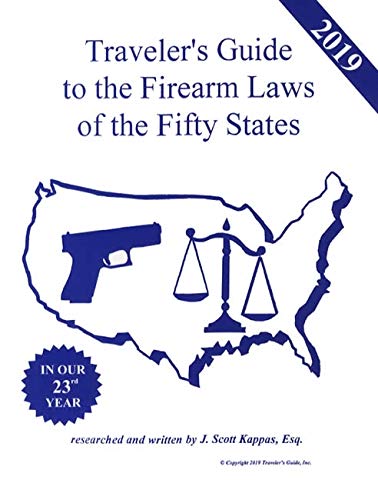
2. Traveler's Guide to the Firearm Laws of the Fifty States
By J. Scott Kappas
Provides an easy-to-understand reference guide compiling gun-related laws for all fifty states, the District of Columbia, Canada, and Mexico. Includes definitions of important terms and statutory language. Features coverage on vehicle carry of firearms, concealed carry and reciprocity for non-resident licensees, and laws governing possession of all types of firearms. Rates each state for its treatment of firearms, noting any changes in "firearms freedom" from the previous year as well as the reason behind the change.
Traveler's Guide, Inc., 2019. 67 pages.
363.33 T697 2019
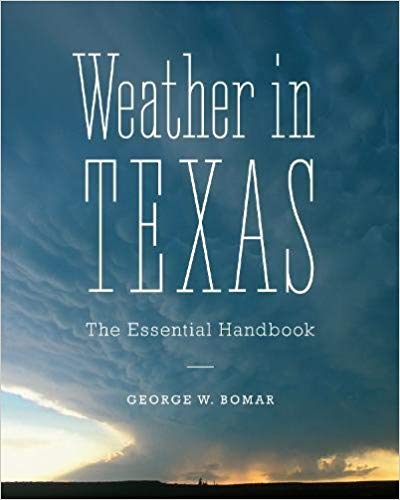
3. Weather in Texas: The Essential Handbook
By George Bomar
Offers an introductory framework describing how weather functions. Discusses specific weather phenomena such as heavy rains, tornadoes, and hurricanes. Includes numerous charts and maps providing information about average weather conditions and extreme events.
University of Texas Press, 2017. 290 pages.
551.69764 B639W 2017
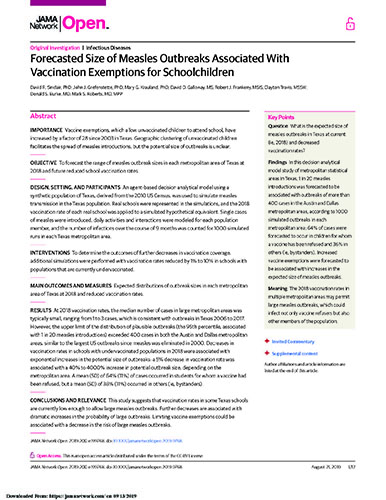
4. Forecasted Size of Measles Outbreaks Associated with Vaccination Exemptions for Schoolchildren
By David Sinclair
Uses 2018 vaccination rates to evaluate the risk of widespread measles outbreaks occurring in Texas due to increased vaccine exemptions. Reports a 5 percent decrease in the vaccination rate was associated with a 40 - 4,000 percent increase in the potential outbreak size. Suggests that vaccination rates are already low enough in some Texas schools to allow for large measles outbreaks in the Austin and Dallas metropolitan areas.
American Medical Association, 2019. 12 pages.
Online at: https://jamanetwork.com/journals/jamanetworkopen/fullarticle/2748595
614.47 SI62V 2019
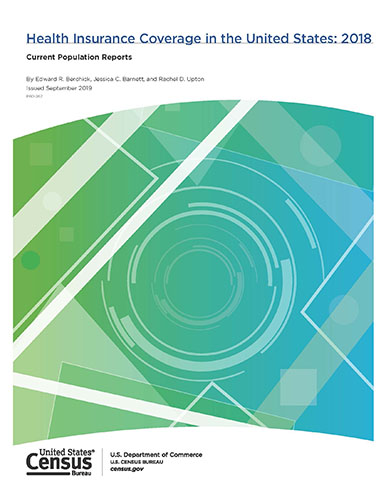
5. Health Insurance Coverage in the United States: 2018
By Edward R. Berchick, Jessica C. Barnett, and Rachel D. Upton
Presents statistics on health insurance coverage in the U.S. in 2018 and changes in coverage between 2017 and 2018. Reports more than 5 million (17.7 percent) Texas residents were uninsured last year, compared with 4.8 million (17.3 percent) in 2017.
U.S. Census Bureau, 2019. 44 pages.
Online at: https://www.census.gov/content/dam/Census/library/publications/2019/demo/p60-267.pdf
312.0973 P60HC 2019
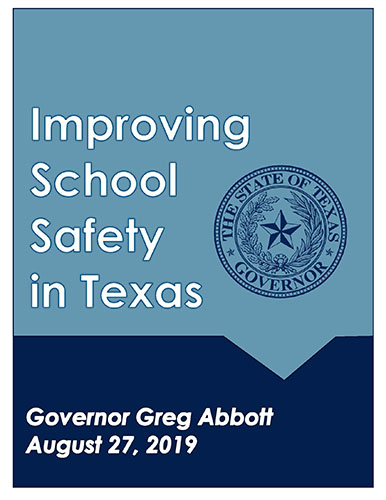
6. Improving School Safety in Texas
By Governor Greg Abbott
Addresses implementation of recommendations made in the School Safety Action Plan and the subsequent update, both released in 2018 in response to school shooting events in Texas. Discusses strategies for making schools safer and preventing threats in advance. Highlights legislation from the 86th Legislature designed to improve school safety and provide funding for these improvements.
Office of the Governor, 2019. 23 pages.
Online at: https://gov.texas.gov/uploads/files/press/Aug_2019_School_Safety_Update.pdf
G648.8 SCH65 2019
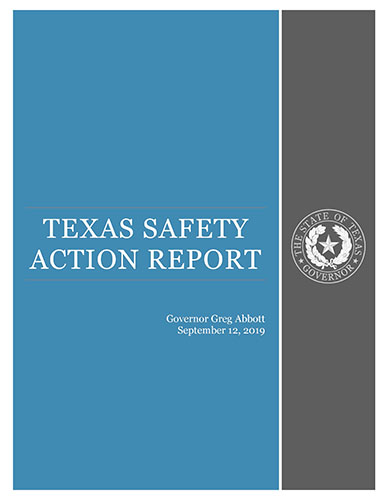
7. Texas Safety Action Report
By Governor Greg Abbott
Summarizes plans to address public safety in the wake of recent mass shootings in Texas. Details the Governor's eight executive orders related to reporting and responding to suspicious activity and threats. Recommends steps some state agencies may take in the immediate future, and policy changes the Legislature should consider regarding firearm safety and underlying issues related to schools and students.
Office of the Governor, 2019. 14 pages.
Online at: https://gov.texas.gov/uploads/files/press/Texas_Safety_Action_Report.pdf
G648.8 SA17 2019
- Track obesity prevalence state by state. (Centers for Disease Control and Prevention, September 12, 2019)
- Explore the new version of the Constitution Annotated. (Library of Congress, September 16, 2019)
- View county health data in Texas. (Episcopal Health Foundation, 2019)
- Read about the American veteran experience. (Pew Research Center, September 10, 2019)
- "The state of the future." By Erin Edgemon. Austin Business Journal, September 13, 2019, pp. 17-20.
Highlights the Texas Facilities Commission [TFC], the agency that serves as the real estate management and construction group for the state. Points out TFC's role in the Capitol Complex expansion and features an interview with Mike Novak, TFC's executive director. - "Builders, developers, weigh benefits of balancing, cutting DFW housing rules." By Bill Hethcock. Dallas Business Journal, September 6, 2019, pp. 12-15.
Examines the debate between companies seeking to standardize building and land-use regulations across the DFW area and local governments that want the right to control the aesthetics of new development to preserve cities' unique characteristics. Provides overview of HB2439, 86th Legislature. - "Shootings and gun laws." Economist, September 7th-13th, 2019, pp. 27-28.
Highlights research indicating Republican states tend to loosen their gun laws following mass shootings. - "Quality counts 2019: Grading the states." Education Week, September 4, 2019, pp. 1, 8-15.
Provides a comprehensive report card on the United States' K-12 system. Ranks each state based on a range of academic, school finance, and socioeconomic factors. - "Schools tackle vaping amid new health problems." By Denise R. Superville and Arianna Prothero. Education Week, August 23, 2019, pp. 1, 17.
Discusses the health effects of vaping and the different approaches being used by school administrators to stem student vaping. - "Prescription drug monitoring program mandates: Impact on opioid prescribing and related hospital use." By Hefei Wen, et al. Health Affairs, September 2019, pp. 1550-1556.
Reports that state implementation of prescription drug monitoring programs [PDMPs] was associated with reductions in the opioid prescription rate, the opioid-related inpatient stay rate, and the opioid-related emergency department visit rate. Notes significant Medicaid savings represented in these reductions and advocates for continued attention to PDMPs as a tool in tackling the opioid crisis. - "Education policy responses to the opioid crisis." By Alyssa Rafa. Internet Resource, September 9, 2019, pp. 1-6.
Examines the connection between education policy and the opioid crisis. Provides examples of recent state policies and initiatives, including Texas legislation on opioid misuse education in public schools. - "Medical use of cannabis in 2019." By Kevin P. Hill. JAMA (Journal of the American Medical Association), September 10, 2019, pp. 974-975.
Asserts that evidence is lacking that indicates the efficacy of medical cannabis for most conditions for which its use is advocated. Recommends physicians exercise caution when considering cannabis for their patients. - "Employee contributions to public pension plans (2019)." National Association of State Retirement Administrators, September 2019, pp. 1-12.
Examines employee contribution plan designs across states, policies, and recent trends. Includes a table of employee contribution rates by state, including the Employees Retirement System of Texas and the Teacher Retirement System of Texas. - "Don't legalize prostitution." By Madeleine Kearns. National Review, August 26, 2019, pp. 22, 24, 26-28.
Examines the experiences of different countries with legalized prostitution and profiles some young women working as prostitutes. Suggests legalizing prostitution would not make it safer for those involved and would not have the desired effect of decreasing sex trafficking. - "The message of measles." By Nick Paumgarten. New Yorker, September 2, 2019, pp. 38-47.
Explores recent measles outbreaks in the United States, focusing on New York, the first state to pass a vaccination law with a religious exemption. Explains the state removed religious exemptions from the law this summer amid a growing number measles cases and a growing movement of vaccine hesitancy and refusal. - "The long-term forecast for the United States economy." By M. Ray Perryman. Perryman Report and Texas Letter, Vol. 36, No. 5, pp. 1-3, 6.
Highlights recent trends in global trade controversies as well as expectations for long-term domestic economic performance during the 2018 to 2045 period. - "PDK poll of the public's attitudes toward the public schools." Phi Delta Kappan, September 2019, pp. K1-K23.
Presents the results of the 51st annual PDK [Phi Delta Kappan] poll of the public's attitudes toward public schools. Reports Americans named the lack of financial support for public schools as the biggest problem facing their local schools. - "Designing better sugary drink taxes." By Anna H. Grummon, et al. Science, September 6, 2019, pp. 989-990.
Proposes taxing the amount of sugar in a drink per gram instead of taxing by drink volume. Suggests taxing the sugar rather than the drink will encourage consumers to consume drinks with less sugar. - "Doctors drive new opioid laws." By Joey Berlin. Texas Medicine, September 2019, pp. 26-28.
Summarizes new laws relating to opioids that will affect physicians' use of prescription monitoring programs [PMPs] and how physicians prescribe controlled substances. - "Clearing the air on cannabis." By Sean Price. Texas Medicine, September 2019, pp. 42-44.
Highlights HB1325 and HB3703, 86th Legislature, which loosen rules on the use of cannabis oil. Considers the possible effects on physicians and health care practice. - "Passing oral safe harbor: How one nurse's experience changed the law." By Tonya R. Poore. Texas Nursing, Summer 2019, pp. 12-13.
Narrates the personal experience of a nurse whose difficulty invoking "safe harbor" — a nursing peer review committee determination — inspired HB2410, 86th Legislature, which expedites the process. - "The battle to draw the battle lines." By Philip Elliott. Time, September 16, 2019 , pp. 44-47.
Examines efforts by Democrats to regain control of state legislative chambers in order to shape Congress for the next decade. Considers what Republicans are doing to retain their advantage over congressional redistricting.
- In HB 2689, 78R, a "statement of intent" is included in the April 3, 2003 minutes for the House Licensing and Administrative Procedures Committee.
- In HB 2149, 79R, the May 4, 2005 minutes of the House Licensing and Administrative Procedures Committee note that "Rep. Delwin Jones moved that the official letter of intent be entered in with the minutes."

